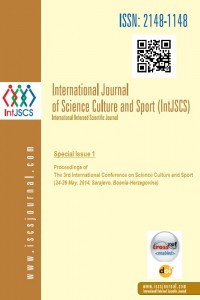Abstract
The Ethics Theories which is based on the self have been developed by Muslim Philosophiers who based on the inherited ethics philisophy literature of Antic Period Greek Philosophiers. The most important feature that separates philosophical ethics perspective from teologic or mystical ethics perspectives is the self theory. At the same time this feature causes philosophical ethics to have universal character. Philosophical ethics theory aims at universal good and virtue. It is based on conditions and behaviors that have become skills and without change in a short time. Despite the effect of environmental factors, habits appear on a large scale based on people's temperament and they form moral behaviors' foundation. Habit is a general concept that express both virtue and non-virtue. because ideal of the ethics is virtue, we are going to talk about virtue in this communique.
There are three sources of habits in the self. Both lust power and wrath power are animal incitement powers. And the third one is mind that forms people's essence. The power of lust enables people to attract the things which they need while the power of wrath enables people to get rid of the things which they think think are harmful. Mind enables using of these powers in balance, therefore it is a manager and controller of them. The virtue of chastity arises from the balanced move of the lust power and the virtue of bravery originates from the balanced move of the power of wrath. The independent virtue of mind is wisdom. It is thought-ptovoking that the mind is responsible moderation and control of instigation powers. If the mind is balanced, it is a source of wisdom virtue. If the mind isn't balanced, it is a source of non-virtue. The virtue of justice appears when, based on the powers, the basic virtues which are formed from chastity, bravery and wisdom are in complete balance. In this case it is understood that justice a combination of virtues in one respect and the essence of them in another respects. In this case we say that there are four basic virtues and secondary virtues arise from them. If people use their psychological and mental abilities in a good way, they will be virtuous and happy. Otherwise, they will be unhappy. Moral perfection and happiness are possible for every person with no exception in any religion or culture. In terms of philosophical ethics, religion and cultural factors cannot form moral values with the norms of they have put. They can only contribute to their preservation and development.
Keywords
Abstract
Bu çalışmanın amacı sınıf öğretmeni adaylarının „ayrıt‟ terimine ait açıklamalarının matematiksel düşüncenin gelişim aşamalarına göre incelenmesidir. Araştırma sorusu „Ayrıt terimini üç düzeyde açıklayıp, üç sorudan oluşan çalışma yaprağı oluşturunuz’ şeklinde olan çalışma 2013-2014 bahar yarıyılında gerçekleştirilmiştir. Araştırmanın verilerini 195 sınıf öğretmeni adayından Matematik Öğretimi-II dersinin vize sınavında elde edilen yanıtlar oluşturmaktadır. Ayrıt terimini üç aşamada tam olarak açıklayıp üç problemden oluşan çalışma yaprağı oluşturan öğretmen adaylarının yanı sıra üç aşamada açıklayıp çalışma yaprağı hazırken açıklamalarına uygun olmayan çalışma yaprağı oluşturan adayların da olduğu görülmektedir. Ayrıca hem üç aşamada ayrıt terimini açıklayamayan hem de çalışma yaprağında doğru ifade edemeyen sınıf öğretmeni adaylarının bulunduğu görülmektedir
Details
| Primary Language | Turkish |
|---|---|
| Journal Section | Articles |
| Authors | |
| Publication Date | March 22, 2016 |
| Published in Issue | Year 2014 Volume 2 (Special Issue 1) |


